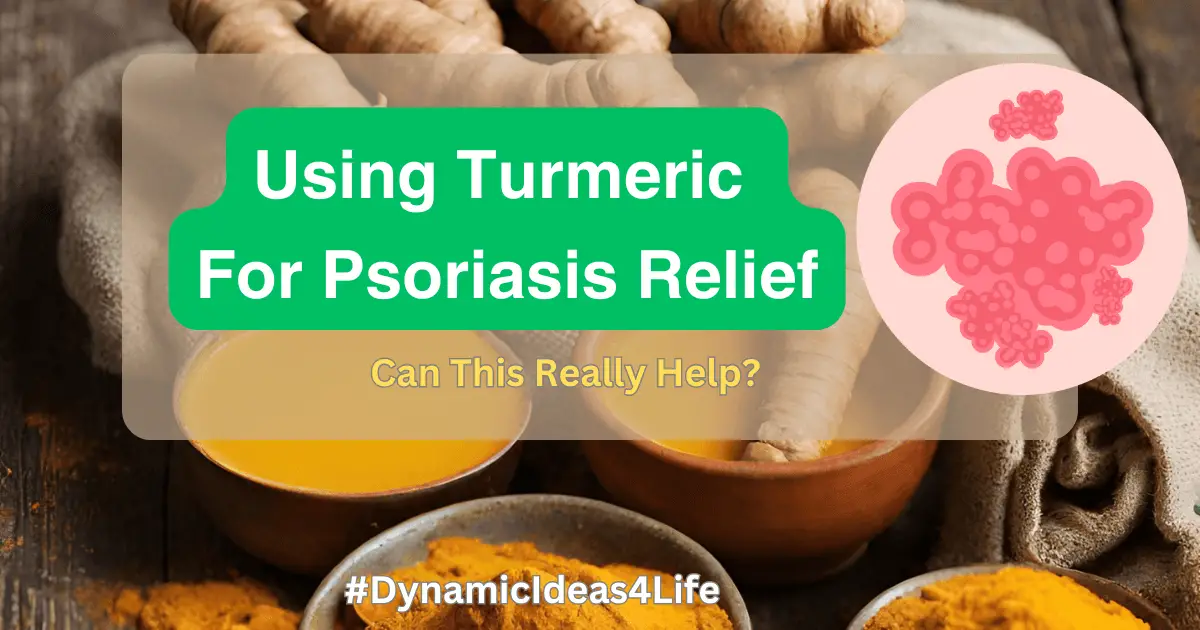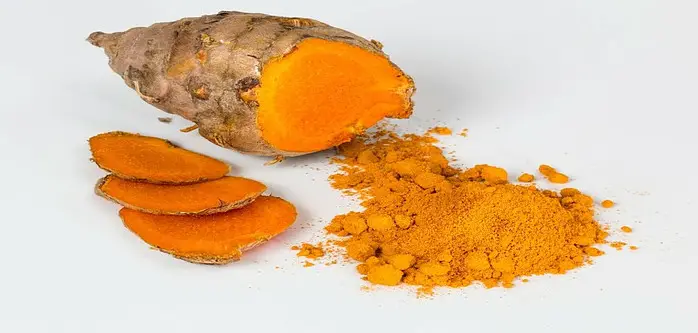
For those that are unaware Psoriasis is a chronic autoimmune condition that affects MILLIONS of people Worldwide. It is characterized by red, itchy, and scaly patches on the skin, which can be both physically and emotionally distressing for those who suffer from this condition.
When it comes to treatment, while there are various options available, many individuals are seeking natural remedies to help get this condition under control. There are many things that people can try but one natural remedy we will take a look at is Turmeric for Psoriasis Relief.
This is a popular remedy in both TCM and Ayurveda but when we consider skincare and Psoriasis this is a topic that one might want to explore further. There is certainly conflicting information in regards to this but If this is something that interests you then please keep on reading.
We hope this information can be helpful especially if you or someone you care for suffers from this condition.
The Healing Power of Turmeric for Psoriasis Relief
Understanding Psoriasis and its Symptoms
Psoriasis is a skin condition that causes the rapid buildup of skin cells. This buildup leads to the formation of thick, silvery scales and itchy, dry patches on the skin. For those affected, it is very clear to see and whilst the exact cause of this condition is unknown, it is believed to be related to an immune system malfunction.
Common symptoms of psoriasis include red patches of skin covered with thick, silvery scales, dry and cracked skin that may bleed with itching and burning sensations, and swollen and stiff joints. If you have Psoriasis it’s definitely something you will want gone.
Type of Psoriasis
Several types of Psoriasis can affect people. These include;
- Plaque Psoriasis,
- Guttate Psoriasis,
- Inverse Psoriasis,
- Pustular Psoriasis, and
- Erythrodermic Psoriasis.
Plaque psoriasis is the most common form and is characterized by raised, red patches covered with a silvery-white buildup of dead skin cells.
Guttate Psoriasis appears as small, dot-like lesions on the skin, often triggered by a bacterial infection. Whilst Inverse psoriasis affects the skin folds, such as the armpits and groin area.
Pustular psoriasis is characterized by pus-filled blisters on the skin, and Erythrodermic Psoriasis, which is a rare form of this disease, covers large areas of the body with red, peeling skin. You would hope you don’t have this kind but no type of Psoriasis is very comfortable to live with. All you would hope you can bring into remission.
*Many say that Vitamin D is a good remedy for Psoriasis. One of my relatives regularly travels to warmer climates to help manage their condition. I haven’t asked them if they have tried Turmeric but anyway – let’s take a look at this…
Understanding the Benefits of Turmeric for Psoriasis

“Turmeric has been used for centuries in traditional medicine for its numerous health benefits. It is derived from the root of the Curcuma longa plant and contains a compound inside called curcumin, which is responsible for its medicinal properties”.
For centuries Turmeric has been used to treat a wide range of conditions, including;
- Inflammation,
- Digestive Disorders, and
- Skin Conditions.
One of the key benefits of turmeric for psoriasis is its anti-inflammatory properties. Psoriasis is an inflammatory condition, and turmeric has been shown to reduce inflammation in the body.
It is also In addition to this a potent antioxidant, which means it can help protect the body against damage from free radicals.
This is important for individuals with psoriasis, as oxidative stress is believed to play a role in the development and progression of this condition.
Turmeric has other health benefits too! that can be beneficial for those who add this to their diet or supplement regimen. It is known to improve digestion, boost the immune system, and promote healthy skin just for starters.
But, Turmeric can also help reduce pain and swelling associated with Psoriatic Arthritis, a condition that affects some individuals with psoriasis.
In Ayurveda traditions, many practitioners swear by the healing ability of Turmeric and Curcumin. After many 100’s of years this powerful antioxidant is STILL very popular and the fact that so many products are available to buy with Curcumin inside really says it all.
So What Does Curcumin Do?
Curcumin is the active ingredient in turmeric that is responsible for its medicinal properties. It is a bright yellow chemical compound that belongs to a group of compounds called Curcuminoids.
Curcumin is extracted from turmeric through a process called extraction, which involves grinding the turmeric root into a fine powder and then extracting the Curcumin using solvents.
Curcumin has been extensively studied for its potential health benefits. It has been shown to have anti-inflammatory, antioxidant, and anticancer properties.
It also has antimicrobial and antifungal properties, which can help protect against infections. To find out more about these properties check out Dr Eric Bergs’s video below…
How Curcumin Works to Reduce Inflammation in Psoriasis
Inflammation plays a key role in the development and progression of Psoriasis. When the immune system is activated, it releases inflammatory chemicals that cause the skin cells to multiply rapidly, leading to the formation of plaques.
Curcumin has been shown to reduce inflammation by inhibiting the production of inflammatory chemicals in the body.
Curcumin also targets specific molecules and pathways involved in the inflammatory process. It has been shown to inhibit the activity of enzymes that promote inflammation, such as cyclooxygenase-2 (COX-2) and lipoxygenase (LOX).
Curcumin also inhibits the production of pro-inflammatory cytokines, which are signaling molecules that play a role in the immune response.
PLUS In addition to its anti-inflammatory properties, Curcumin has been shown to have other mechanisms of action in Psoriasis. It has been shown to inhibit the growth of skin cells and reduce the production of Keratin, a protein that is overproduced in psoriasis. Curcumin also has antioxidant properties, which can help protect against oxidative stress and damage to the skin cells.
Research Studies on the Effectiveness of Turmeric for Psoriasis – Does This Really Help Relieve Symptoms?
There have been several clinical studies conducted to evaluate the effectiveness of turmeric for psoriasis. These studies have shown promising results, but it is important to note that more research is needed to fully understand the potential benefits of turmeric for psoriasis.
One study published in the Journal Phytotherapy Research found that a topical cream containing Curcumin was effective in reducing the severity of psoriasis symptoms. [2]
The study involved 40 patients with mild to moderate plaque psoriasis who applied the cream twice daily for 12 weeks. At the end of the study, the researchers found that the cream significantly reduced the severity of psoriasis symptoms, including redness, scaling, and itching.
Another study published in the journal Clinical, Cosmetic and Investigational Dermatology evaluated the effectiveness of a combination of Curcumin and Piperine, a compound found in black pepper, for the treatment of Psoriasis.
The study involved 45 patients with mild to moderate plaque psoriasis who were randomly assigned to receive either the curcumin-piperine combination or a placebo for 12 weeks. The researchers found that the curcumin-piperine combination significantly reduced the severity of psoriasis symptoms compared to the placebo.
While these studies show promising results, it is important to note that more research is needed to confirm the effectiveness of turmeric for psoriasis. It is also important to consult with a healthcare professional before starting any new psoriasis treatment.
Incorporating Turmeric into Your Diet for Psoriasis Relief
There are several ways to incorporate turmeric into your diet to help relieve psoriasis symptoms. One of the easiest ways is to add turmeric powder to your meals. You can sprinkle it on roasted vegetables, add it to soups and stews, or mix it into salad dressings.
Turmeric can also be used to make a delicious and healthy golden milk latte. Simply heat milk (dairy or plant-based) with turmeric, ginger, cinnamon, and a sweetener of your choice.
Another option is to take turmeric supplements.
These supplements are available in capsule form and can be taken daily and there are many different ones to choose from.
However, It is important to choose a high-quality supplement that contains a standardized amount of Curcumin. There are many Turmeric Supplements to choose from. Many with Piperine as a secondary Ingredient but what we recommend is Organic Fermented Turmeric with Vitamin D
[Read More About Our Top Pick HERE<<}
Dosage recommendations for turmeric vary depending on the individual and the severity of their symptoms. Like always It is best to consult with a healthcare professional to determine the appropriate dosage for you.
Topical Applications of Turmeric for Psoriasis
In addition to consuming turmeric, it can also be applied topically to the skin to help relieve psoriasis symptoms. One way to do this is by making a turmeric paste.
To make a turmeric paste, mix turmeric powder with water or coconut oil until it forms a thick paste. Apply the paste directly to the affected areas of the skin and leave it on for 15-20 minutes before rinsing off.
Another option is to use turmeric essential oil.
Turmeric essential oil can be diluted with a carrier oil, such as coconut oil or jojoba oil, and applied directly to the skin. However, It is important to do a patch test before applying turmeric essential oil to a larger area of the skin to check for any allergic reactions.
It is important to note that turmeric can stain the skin and clothing, so it is best to wear old clothes or use a towel to protect your clothing when applying turmeric topically.
Precautions and Side Effects of Using Turmeric for Psoriasis
While turmeric is generally considered safe for most people, there are some precautions and potential side effects to be aware of.
Turmeric can interact with certain medications, including blood thinners, antiplatelet drugs, and nonsteroidal anti-inflammatory drugs (NSAIDs).
For these reasons, It is important to consult with a healthcare professional before using turmeric if you are taking any medications.
Some individuals may experience side effects from turmeric, such as stomach upset, diarrhea, and nausea. These side effects are usually mild and go away on their own. However, if you experience any severe or persistent side effects, it is important to stop using turmeric and consult with a healthcare professional.
It is also important to note that turmeric can cause allergic reactions in some individuals. If you have a known allergy to turmeric or any other members of the ginger family, it is best to avoid using turmeric.
Other Natural Remedies for Psoriasis Relief
While turmeric shows promise as a natural remedy for psoriasis relief, other natural remedies can be used in conjunction with turmeric to further enhance its effectiveness.
Some of these remedies include:
- Aloe vera: Aloe vera gel can help soothe and moisturize the skin, reducing redness and itching associated with psoriasis.
- Fish oil: Fish oil supplements, which contain omega-3 fatty acids, have been shown to reduce inflammation and improve symptoms of psoriasis.
- Dead Sea salt baths: Soaking in a bath with Dead Sea salt can help remove scales and reduce inflammation in the skin.
- Tea tree oil: Tea tree oil has antimicrobial properties and can help reduce itching and inflammation associated with psoriasis.
- Probiotics: Probiotics, which are beneficial bacteria, can help improve gut health and reduce inflammation in the body.
It is important to note that while these natural remedies may provide relief for some individuals, they may not work for everyone. It is best to consult with a healthcare professional before starting any new psoriasis treatment.
Conclusion: The Promising Future of Turmeric for Psoriasis Treatment and Relief
In conclusion, turmeric shows promise as a natural remedy for psoriasis relief. Its anti-inflammatory and antioxidant properties make it a potential treatment option for individuals with psoriasis. While more research is needed to fully understand the effectiveness of turmeric for psoriasis, the existing studies are promising.
Turmeric can be incorporated into the diet by adding it to meals or taking it as a supplement. It can also be applied topically to the skin to help relieve psoriasis symptoms.
However, it is important to use caution when using turmeric, as it can interact with certain medications and cause side effects in some individuals.
In addition to turmeric, other natural remedies can be used in conjunction with turmeric to further enhance its effectiveness. These remedies include aloe vera, fish oil, Dead Sea salt baths, tea tree oil, and probiotics.
Seaweed may be a good remedy too as its high Iodine content is good for the thyroid and the Thyroid hormones are believed to play a role in Psoriasis flare-ups.
Overall, the future looks promising for turmeric as a natural treatment option for individuals with psoriasis. With further research and understanding of its mechanisms of action, turmeric may become a valuable addition to the treatment options available for psoriasis.
Reference:
- 1.) https://www.ncbi.nlm.nih.gov/pmc/articles/PMC5816303/
2.) Phytotherapy Research | Medicinal Chemistry Journal - 3.) https://onlinelibrary.wiley.com/doi/10.1111/jocd.12513
- 4.) https://academic.oup.com/ced/advance-article-abstract/doi/10.1093/ced/llad328/7283883?redirectedFrom=fulltext
- 5.) http://www.jcimjournal.com/EN/10.1016/j.joim.2018.11.004







